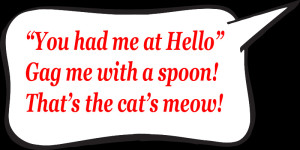 Generations come and generations go and with them come language expressions that come in and then go out of style. To establish independence, the younger generation of kids wants their own vocabulary and way of talking, so they add new words into the vocabulary. But you have to be of a certain age to use them. It just sounds weird, like you’re trying too hard to be cool, if you are of an age and are using words from another generation. Don’t be that person.
Generations come and generations go and with them come language expressions that come in and then go out of style. To establish independence, the younger generation of kids wants their own vocabulary and way of talking, so they add new words into the vocabulary. But you have to be of a certain age to use them. It just sounds weird, like you’re trying too hard to be cool, if you are of an age and are using words from another generation. Don’t be that person.
Remember when “sick” and “bomb” used to describe something bad? Recall the days when “groovy” , “boss”, “square”, “bummer”, and life was “a gas”? – ahh, the relic concepts that live only in memory and no longer on tongues.
Since I am well over 40, many expressions today make me wince because they are grossly overused:
“No problem!”, “Enjoy!”, “At the end of the day”, “not a happy camper”, “It is what it is”, “Have a good day!” and all iterations of it: “Have a great day!”, “Make it a good one!”, “You have a good day!” – this last one is my all time most hated version – don’t tell me what to do, which you don’t even mean anyway!
An overused expression is a cliché, but the people using them turn into a cliché themselves. Clichés are a reflection of mental laziness – why bother to think and say anything original when you can just fall into the familiar routine of old tired expressions. Much of language are habits – patterns that we rely on because they are easy. Don’t need to think – all the heavy lifting has been done for us. Hey, don’t knock them if they work – hmmm, do they really work?
No one really listens to clichés because they are just filler words and not meant to carry real meaning. One of the oldest meaningless expressions is the question “How do you do?” which is not meant to be taken literally – heads up: if you get asked this rare question, know that the asker doesn’t give a fig about how you are; it’s a question not expecting a real answer. If you honestly answer with, “I’m glad you asked; I’m feeling pretty terrible actually… there’s this pain in my back that just won’t go away, and oh those headaches!” “Yeah, yeah, shut it – I really don’t want to hear all about your numerous medical troubles.”
The correct answer to “How do you do?” is a “How do you do?” right back at the asker. One good meaningless question deserves another. And the answer to the second “How do you do?” is silence. Yes, nothing in reply; you launched the first volley, it was returned, and you don’t get another go. The conversation then turns to the weather.
How did our communication in polite society get to be meaningless? Due to constantly seeking shortcuts to save valuable time, we have clipped all of the meaning out of some language. It must be baffling for foreigners learning English to try to understand the idiomatic part of the language. Why say something to mean something else, or bother with saying something with no meaning entirely? We have shortcutted our way to irrelevance.
It is irrelevant if I have a nice day or not. It is irrelevant if I enjoy something or not. Sadly, it is irrelevant if I am a happy camper or not, when I have a serious product complaint.
We say things to be nice, because we were raised to be polite boys and girls, and it wouldn’t do to be rude. So we fill in the silence (we hate silence) with meaningless words, which when spoken in parting are code for “time to leave, on your way now, get going”. Instead, an honest “Isn’t it about time for you to be leaving?” might be refreshing! (But how very rude!) Since we also hate taking a risk for zero gain, routine rudeness is never going to happen.
What’s that empty overused expression that makes you crazy?
